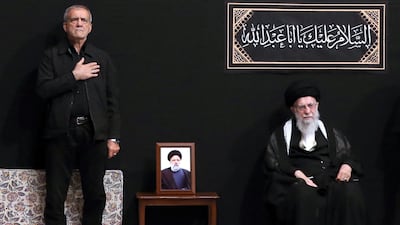Every time former Iranian foreign minister Mohammad Javad Zarif appears on television, it’s fair to expect some drama or controversy. Such is the nature of the combative career diplomat.
Mr Zarif, who has been tasked with picking cabinet ministers for President-elect Masoud Pezeshkian’s incoming administration, ruffled many feathers last week when he revealed a points system for the process.
To overcome the historical marginalisation of youth, women and religious minorities, Mr Zarif said in the televised interview, candidates who are below 50 years old, female and from non-Shiite backgrounds, will get extra points. Conversely, “if you are a man, you get no points … if you are a Shiite Muslim, you get no points”, he added.

Mr Zarif’s words predictably caused a storm. But they can be misleading when taken out of context, for these affirmative action measures cover just 30 out of the 160 points that are up for grabs. That said, Mr Zarif’s remarks are a timely reminder for just how lopsided the history of representation in post-1979 Iran has been.
Only one woman has served as cabinet minister since the 1979 revolution (10 other women have served as vice presidents, but they don’t get cabinet rank). Every single minister has been from the Shiite community. Even though 10 per cent of Iran’s population is comprised of Sunnis, they have never been represented in cabinet. The last Sunni minister served during the Shah’s regime. This lack of representation is also true for tens of thousands of Iranians who belong to the officially recognised religions of Judaism, Christianity and Zoroastrianism.
There is an apparent regional bias when picking ministers, too, with almost 40 per cent of them having hailed from either the Tehran or Isfahan provinces.
That Dr Pezeshkian has dedicated some of his political capital to overcome such historical marginalisation comes as no surprise: he is an ethnic Turkic Azeri from north-western Iran, whose mother tongue is Kurdish. During his presidential campaign, he pledged better rights and representation for minorities, especially for those of Kurdish and Baloch heritage.

However, Mr Zarif’s words quickly gave Dr Pezeshkian’s opponents, as well as hardliners on social media, an opening to criticise his policy.
Fars news agency, linked to the Islamic Revolutionary Guard Corps, published an article under the headline, “Zero points for Shia”, which parroted an argument commonly heard among the hard right in the West. “This isn’t creation of opportunity but the opposite of equality in opportunity and increasing of discrimination,” it read. “In the points system for the next government, a 30-year-old Jewish woman will have a higher point than a 30-year-old Shia man, just because of gender and minority status.”
The hardline MP Mahmoud Nabavian was even harsher and personal in his attack, pointing to the fact that Mr Zarif spent his formative years in the US – which Mr Nabavian called “the land of unbelievers” – and essentially accusing him of being a western stooge.
To their credit, Dr Pezeshkian and Mr Zarif have stood their ground, with the latter defending affirmative action as “a well-known global method to reduce inequalities”.
There has been some blowback against the hardliners. Ahmad Zeidabadi, a reform-minded journalist, mocked them for criticising affirmative action while claiming to defend the Palestinian people. “If people of Gaza lived in Iran, and were citizens here, should they have been deprived of their political rights?” Zeidabadi pointed out.
The battle over representation has been just one aspect of the fractious process of cabinet formation.
With reformists having long been out of power, many among them have hurried back to the political scene, banging on Dr Pezeshkian’s door and demanding a seat at the table. At the same time, with the President-elect having run as a technocratic centrist, there was hope on the right that he will pick conservative voices, too.
Mr Zarif said he had sought suggestions from conservative figures but that the final cabinet will be “not a coalition” and will, instead, reflect Dr Pezeshkian’s convictions. These convictions include being “pro-justice” and “a voice for the voiceless”, as well as pursuing “rights and demands of women, youth and ethnicities”.
Dr Pezeshkian, who will be inaugurated next week, is likely to present his cabinet picks to the Parliament by August 5, with MPs confirming or rejecting the names through a vote.
At least 60 per cent of these picks, according to Mr Zarif, are likely to be new faces. But how inclusive the team will actually end up being remains to be seen. After all, Dr Pezeshkian’s powers are limited. He will require Iran’s supreme leader, Ayatollah Ali Khamenei, to approve the most important ministerial candidates before they are introduced to the country’s parliamentarians. In which case, Mr Khamenei’s support could help the President-elect overcome opposition from the hardline MPs. For what it’s worth, he has called on parliamentarians to “urgently vote” on Dr Pezeshkian’s picks, adding: “The sooner the suggested cabinet is confirmed by a vote, the better.”
If Dr Pezeshkian and Mr Zarif indeed succeed in creating an inclusive cabinet, it will go a long way in assuaging concerns among Iran’s various civic movements that are generally mistrustful of the regime and its institutions.
But the path towards broad-based civic inclusion in the country remains long. Just ask followers of the Bahai faith, who are the country’s largest non-Muslim minority group. Not only are their dreams of serving in government blocked, they are also denied basic rights such as pursuing a university education. In Iran, the arc of history is even longer.


